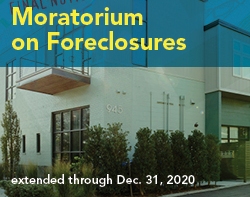 Regular readers of this blog have been able to get information on how the COVID-19 pandemic has affected foreclosure actions in New York. This post will serve as an update on current conditions in New York Courts.
Regular readers of this blog have been able to get information on how the COVID-19 pandemic has affected foreclosure actions in New York. This post will serve as an update on current conditions in New York Courts.
At the beginning of the pandemic, New York Courts closed for all matters, including foreclosure cases. In addition, executive orders from Governor Cuomo stayed all foreclosure cases from proceeding. This meant that, at that time, no new foreclosure cases could be filed, and all foreclosure cases previously filed would not be allowed to proceed until allowed by New York State.
This obviously was a benefit to any party subject to a foreclosure action. Even if the Court had, before the pandemic, granted a judgment of foreclosure and sale, the actual sale was not allowed to proceed. In addition, both New York State and the federal government imposed further legal restrictions on all evictions. This meant that even if the foreclosure sale had occurred prior to the “freezing” of all foreclosure cases, the new owner, whether it was the original lender or a successful bidder at a sale, had no legal means of evicting the former owner.
However, it is not possible to “stay” all legal proceedings indefinitely. Courts are now allowed to reopen, although many Courts have replaced in person hearings with virtual appearances. In addition, it is possible that Courts may close again at any time, due to current conditions existing as of this writing. In the meantime, foreclosure cases are allowed to proceed, although adjustments have been made for COVID issues.
What this means in practical terms is that most Supreme Courts in New York handling foreclosure matters are requiring litigants to have a preliminary conference before they are allowed to take any new actions in already existing cases. This hearing will be scheduled by the Court, and parties are generally required to appear virtually if no in-person appearances are being scheduled. At these conferences, the parties need to show that COVID conditions have had no effect on the party being foreclosed. For example, if a case was started several years ago, due to a borrower’s default, the borrower cannot claim that COVID caused the default.
However, if this case is a recently filed one, and the borrower can demonstrate that COVID conditions contributed to his default, the Court is likely to impose a further delay in the litigation, and will also encourage the parties to attempt to resolve the matter through a financial compromise, rather than through the Court system.
All foreclosure cases currently outstanding in the Courts must be vetted in this manner. Even surplus fund proceedings, which occur after the property has been sold, are subject to a preliminary conference prior to any motions being allowed to proceed. When the Courts will allow actions to proceed as they did prior to the pandemic is not clear at this point, so we advise all litigants in foreclosure cases to engage experienced counsel to navigate current conditions.
 New York Real Estate Lawyers Blog
New York Real Estate Lawyers Blog

